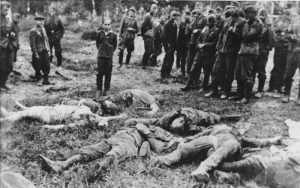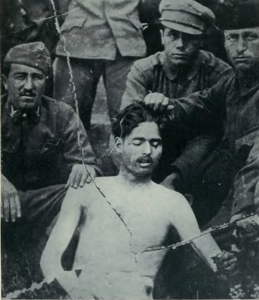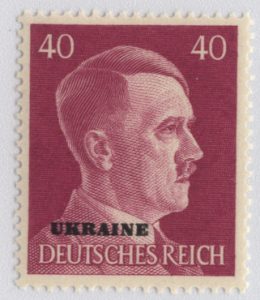American policy in Eastern Europe suffers from three major problems: historical myopia, historical revisionism, and cultural imperialism. In a region of the world where the Austro-Hungarian and the Ottoman Empires are still as present in people’s minds as they were on the threshold of the First World War, America’s policies choose to see history as having begun with the collapse of the Soviet Union in 1990. The independence, sovereignty, and territorial integrity of countries such as Ukraine, Belarus, and Moldavia are considered as inviolate as those of France, Germany, or Great Britain. And yet it is worth recalling exactly how these countries and their territorial boundaries came into being.
The collapse of the Russian Empire was precipitated in the autumn of 1917 via a coup d’état perpetrated by an armed gang of Bolsheviks headed by the infamous troika of Vladimir Lenin, Leo Trotsky, and Joseph Stalin. The anti-imperialist and anti-Russian foundations of the Bolshevik ideology were bolstered by the Marxist communist tenets of proletarian internationalism. Marx taught that national and ethnic boundaries were social constructs used by the ruling classes to suppress the working class by abusing its natural patriotic sentiments and by using the constant threat of war to sacrifice it on the battlefield for their own profit. Following through on this ideological foundation as soon as they obtained even the most tenuous foothold on power in Saint Petersburgh, the Bolsheviks took Russia out of WWI by signing a one-sided peace with Germany in which they ceded to it vast territories in Poland and in the Baltics. The foundations for the three independent Baltics states of Latvia, Lithuania, and Estonia that we know today were laid in that deal signed by Bolshevik Russia and Imperial Germany.
Opinion: Russia intensifies its campaign to paint Ukraine with Nazi colors
Following their victory in the Russian Civil War of 1917 – 1919, the Bolsheviks needed to establish a new political entity that would supplant the no longer existing Russian Empire and take its place within the community of nations. To that end the Bolsheviks once again followed through on their Marxist internationalist ideology. They perceived in Russia and in ethnic Russians the main enemies of the Revolution and its Marxist ideology. Not coincidentally, of the three leaders of the revolution only one, Lenin (Ulyanov), was ethnically Russian (in reality half Kalmyk and quarter Jewish). Stalin (Djugashvili) was Georgian and Trotsky (Bronstein) was Jewish. Hence the Bolsheviks proceeded to tear from Russia any piece of land that could even remotely be seen as not purely ethnically Russian. Thus were born the “republics” of Ukraine, Belarus, Moldavia, Georgia, Armenia, and more. Some of these territories (Georgia, Armenia) were occupied by the Russian Empire in its battles with the Ottoman Empire throughout the 19th century. Others (Ukraine, Belarus), were part of Russia for centuries. Crucially, none experienced any kind of independence in the past half-millennium.

II.Weltkrieg 1939-45
Der überlebende halbwüchsige Sohn dieser ermordeten Familie wird an die Mordstelle herangeführt. Von dem hinter ihm stehenden faschistischen deutschen Offizier wurde er durch Genickschuss ermordet. 5.7.1941 in Slorow, Ukraine
A 0706/18/30 N –
Since Bolsheviks were totalitarians, it was never their intention to give the newly formed “Soviet Socialist Republics” any real measure of autonomy, whether political or economic. All of the USSR was to be controlled with an iron hand from the new Bolshevik capital of Moscow. That rendered the actual territorial boundaries of the new ethnic republics meaningless in every sense except as an exercise in public relations and virtue signaling by the Bolshevik regime. “Look how progressive we are, freeing up all the oppressed peoples of the Russian Empire and empowering them to restore their quaint ethnic idiosyncrasies!” they were saying to the West and many in the West bought this lie hook, line, and sinker. Since the boundaries were meaningless, the Bolsheviks were very generous. From whole cloth were made up the very generous boundaries of the Ukraine, of Belarus and of Moldavia, the same boundaries that exist today.
Little did the Bolsheviks know that their empire would last little more than eight decades and that their experiment in public relations would prove to be nothing but a huge powder keg that they planted into the very foundations of their country, one with an eighty-two year fuse. And in fact for 82 years the boundaries of the fifteen republics comprising the USSR had little to no real meaning as the country was centrally administered from Moscow. However, when it became clear that the new Russian Empire, now called the USSR, had lost the Cold War and was paying the ultimate price of all losing empires, territorial collapse, these boundaries became of huge importance. At the conference, held in Belarus, in which the USSR was formally dissolved, the Bolshevik powder keg went off with a bang. New countries were born, together with a new and uncertain world order.
The moral of this history is not unimportant. It states that the countries that derive their boundaries from those of former Soviet republics (with the exception of the Baltic countries) owe their boundaries neither to properly constituted international treaties, nor to conquest as part of warfare, whether defensive or offensive. Rather they derive their boundaries from the unilateral action of an illegitimate regime that came to power via a coup d’état followed by a civil war and whose legitimacy was in fact not recognized by Western powers for many years. It would be worthwhile for the West to remember this fact when dealing with Russia and its former imperial possessions.

Image by jammmick
Addressing the second flaw in Western policy in Eastern Europe, that of historical revisionism, it is unavoidable to revisit that 20th century event that is still supreme in European politics – the Holocaust. It is a sad, but unavoidable fact that most Eastern European countries actively or furtively supported the Nazis and their quest to perpetrate genocide on European Jewry. Hungary and Romania actively fought as allies of the Third Reich. In the Baltic states, newly created as Soviet Republics as part of the notorious Ribbentrop – Molotov pact of 1939, murderous anti-Semitism ran rampant, with many Balts joining the ranks of the Gestapo and the SS and willingly serving as camp guards and executioners. Occupied Ukraine was openly and actively collaborationist with the Nazi occupiers; in fact the Ukrainian nationalist movement of that time was indeed fascist and virulently anti-Semitic. Poland, while not collaborating with its occupiers as broadly as the Ukraine, nevertheless assisted in the genocide of its massive (10% of total!) Jewish population. While a few countries are shining examples of resistance (the Czech Republic comes to mind), Eastern Europe as a whole presents a bleak picture of collaborationism and complicity in genocide.
Is Ukrainian Soil Soaked With Too Much Blood?
It is impossible to ignore this past when dealing with Eastern Europe, but acting on it is at odds with the Western policy of Russian containment and hostility to the Putin regime. Thus a new strategy is born, that of historical revisionism. Actual history pitted the Allied Powers of the US, Great Britain, and Russia (the USSR as it was known then), against the Axis Powers of Germany, Italy, Hungary, Romania, and Free Ukraine (a proto-German vassal state). Revised history sees the wholesale destruction in countries like Poland, Hungary, and the Baltics of monuments and memorials to the Red Army units that liberated these countries from Nazi occupation. Red Army graves that so eloquently bear witness to the enormous human price that Russia paid to liberate Eastern Europe from the yoke of Nazism are routinely desecrated with not a word of condemnation from the US or the European Union. More and more Russia is painted as one of the villains in WWII with the boundaries between the warring parties being retroactively redrawn as those between the West (including Germany!) representing the side of freedom and Hitlerite Germany together with Stalinist Russia representing the side of oppression. This revisionist history is both morally and politically wrong; as Roosevelt and Churchill, who entertained no illusions when it came to Stalin, knew full-well in that bloody conflict Russia was on the right side of history; the enormous sacrifice paid by it should never be forgotten.
It is a source of disbelief to the author of these lines that Eastern European countries whether those that are already members of the European Union or those who wish to be so stubbornly cling to the belief that the money and patronage that come with junior membership in the club of Western nations are any more free of strings attached than similar money and patronage that they grudgingly received from the USSR. In exchange for its patronage the USSR exacted from its vassal states primarily military and economic obeisance, forcing upon them membership in the Warsaw Pact and in various Russia-centric economic forums. As to cultural issues – those were mostly left to the discretion of the junior members. Economically, moneys flowed from Russia to its Eastern European allies, not the other way around, though the standard of living in countries like Poland and Hungary was incomparably higher than that in the USSR.

It is undoubtedly true that the USSR treated its Eastern European vassal states harshly, primarily in the first two decades after WWII. The Hungarian uprising of 1956 and the Prague Spring of 1968 were brutally repressed using the full military might of the Soviet Union and those who participated in the uprisings were imprisoned or killed. Interestingly and not coincidentally, it was precisely the refusal by the then General Secretary Mikhail Gorbachev to take similar action to suppress the Solidarnosc uprising in Poland in 1988 that spelled the death knell of the USSR. Gorbachev’s refusal to deploy the Russian tank divisions stationed in Belarus across the Polish border, his refusal to put Lech Walesa on trial followed by his execution, showed the world that the USSR had lost its will to survive. It is well known that the Chinese suppression of the student uprising in Tienanmen Square, when tanks were indeed deployed, was a deliberate message to the West by the Communist Party of China that it was not going to fold like their Soviet counterparts. The results speak for themselves: Chinese communists were able to maintain China’s territorial integrity, grow by many orders of magnitude its economy and with it its military might, all the while maintaining an iron grip on the levers of power. Russia, on the other hand, lost more than half of its population and nearly all of its industrial and agricultural heartlands. Militarily, Russia is but a shadow of the former USSR, with NATO forces currently deployed in many former Warsaw Pact countries. The lesson of these events is clear to any aspiring despot: show weakness and be crushed. This is a lesson Kim Jong Un has learned well.
Having obtained political independence from Russia when its modern-day empire was vanquished by America, Eastern European countries hastened to seek economic and political patronage with the winners of the Cold War. Soon they found out that just like before this patronage does indeed come with strings attached. Those are different strings to be sure. To the great surprise of these newly free and independent nations the price the West extracts for extending its umbrella over them is infinitely higher than the dues the Russians had ever tried to collect. It is the price of cultural and ethnic suicide, no less. The West is adamant and unrelenting in enforcing its dogma of diversity, homosexuality, and anti-religiosity on its newly found vassal states. They must receive vast quantities of refugees, and no, not folks who are nearby and who share with them cultural and ethnic affinity like the Ukrainians, no, they must accept Muslim migrants whose culture and ethnicity are at direct odds to those of Eastern Europe. The twin pillars of the Christian Church, whether Catholic, Orthodox or Protestant, and the specific ethnic identity of each of these nation states are being directly undermined by the Western overlords these Eastern European nations had so foolishly courted. Decision time for them is nigh; do they gather the courage to resist the threat of cultural and ethnic extinction presented to them by the West even at the price of economic hardship and accommodating Russian interests, or do they ride their greed and their hatred of Russia down the hole of oblivion.
America, for its part, should reconsider siding with the European Union in its policies of cultural imperialism in Eastern Europe. It should negotiate with Russia a truly independent status for its lost territories, both near and far, allowing these countries to pursue a path of true non-alliance and national independence, serving as a political and economic buffer and indeed bridge between Western and Russian interests.



